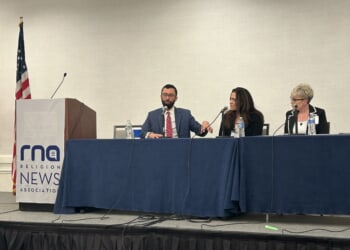Once upon a time, foreign students came to America to study. Now, some arrive to start revolutions — then sue when asked to follow the rules.
Take Momodou Taal, a British-Gambian Ph.D. student at Cornell University. Taal came not to learn but to lead a movement. Armed with a full scholarship and a megaphone, he transformed the campus into his personal stage, preaching anti-Zionist dogma and praising armed “resistance.” When Cornell administrators suspended him for disruptive behavior, he didn’t apologize — he escalated, filing a lawsuit against the U.S. government after Immigration and Customs Enforcement moved to revoke his visa.
America has always welcomed dissent — but never demanded we underwrite it. Free speech is not a hall pass for chaos.
The claim? That deporting him for violating his terms is political persecution.
Let that sink in. A foreign national — funded, protected, and platformed by the United States — accuses the very country enabling him of oppression.
This isn’t just arrogance. It’s a symptom of a deeper sickness: the rise of the litigious revolutionary. And Taal is merely the face of a growing trend.
Earlier this year, we saw a similar outcry over Yara Ismail, an Egyptian-born NYU student who made headlines after leading chants outside the Israeli consulate that many Jewish students said felt openly hostile. When she was flagged by campus security and referred to ICE for a visa review, she became a cause célèbre. A dozen faculty members called her a “defender of human rights.” Never mind the firebomb rhetoric.
Then there was Farid Al-Masri, a Lebanese graduate researcher at UC Berkeley, who publicly supported Hezbollah on social media, referred to the U.S. military as “legitimate targets,” and later had his visa quietly revoked. Within days, Berkeley’s Middle East Studies department declared the move a “McCarthyite crackdown” and filed an amicus brief.
In all three cases, the pattern is identical:
- Arrive in the U.S. on a visa.
- Exploit the freedoms not available in your home country.
- Vilify the very nation hosting you.
- Cry foul when held accountable.
It’s theater. It’s strategy. And it’s increasingly institutionalized. The irony? These activists don’t hate authoritarianism. They hate liberalism, the very philosophy that invites them in. The U.S. is one of the few nations on earth where they can openly criticize, protest, and sue. And yet, they direct their fury here — not toward the oppressive regimes they claim to resist.
That’s what makes Taal’s case so revealing. He isn’t some street-corner radical. He’s the polished face of a movement that weaponizes American values against America itself. He praises violence in Palestine and fights to “globalize the intifada” while enjoying Ivy League comforts. He disrupts campuses in the name of liberation, then retreats into the arms of the First Amendment when challenged.
And elite institutions enable it. Cornell didn’t revoke Taal’s visa. ICE did. Cornell, like Berkeley and NYU, bends over backwards to appease. Because in today’s academic climate, anti-Americanism is currency — and foreign-born firebrands are rarely questioned, much less told “enough.”
But enough is exactly what we need.
America has always welcomed dissent — but never demanded we underwrite it. Free speech is not a hall pass for chaos. And the First Amendment is not a shield against the consequences of breaking immigration law.
Taal, Ismail, and Al-Masri weren’t expelled for their opinions. They were flagged because their actions — praise for violent movements, disrupting academic environments, violating the terms of their visas — crossed a line. And when that line gets erased, the problem isn’t political. It’s structural.
America cannot survive as a nation that invites foreign students in, bolsters their contempt with classroom radicalism, funds their rebellion, and then cowers when they dare the system to respond.
So no — Momodou Taal is not a freedom fighter. He’s a guest who mistook his host’s kindness for weakness. But now we have a president that isn’t standing for this.
Welcome to Cornell. Here’s your mic. Here’s your platform. Here’s your lawsuit.
But don’t be shocked when we hand you your bill — and show you the door.
READ MORE from Kevin Cohen:






![Trump's Admin Guts Another ‘Rogue Government Agency with Zero Accountability’ [WATCH]](https://www.right2024.com/wp-content/uploads/2025/03/Trumps-Admin-Guts-Another-‘Rogue-Government-Agency-with-Zero-Accountability-350x250.jpg)
![‘We All Owe Him (Elon) a Huge Debt of Gratitude’ [WATCH]](https://www.right2024.com/wp-content/uploads/2025/03/‘We-All-Owe-Him-Elon-a-Huge-Debt-of-Gratitude-350x250.jpg)









